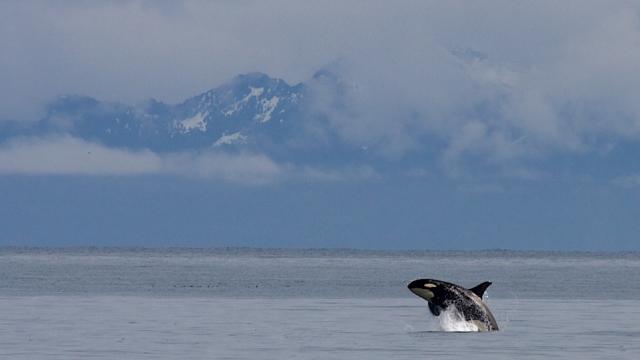There’s a killer whale in France that apparently has a special talent: It sounds like it can mimic human words. That certainly would be impressive and an exciting advancement of human-orca relations, but to my ears, the “words” sound a whole lot like fart noises.
Image: Kenai Fjords National Park /Jim Pfeiffenberger via Flickr
Scientists in Europe and Chile announced that they’d trained a 14-year-old female killer whale named Wikie to mimic words such as “hello”; “one, two”; and “bye bye” at the Marineland Aquarium in Antibes, France. The orca isn’t really speaking, of course. But the ability to copy sounds is important in its own right. Listen below:
If they don’t sound perfectly alike, the authors understand: “Although the subject did not make perfect copies of all novel conspecific and human sounds, they were recognisable copies as assessed by both external independent blind observers and the acoustic analysis,” according to the paper published today in the Proceedings of the Royal Society B.
We humans have pretty advanced vocal skills, if you weren’t already aware. One of our talents is the ability to imitate others in order to learn new sounds. There have been reports of cetaceans, the group that includes whales, dolphins and porpoises, mimicking other animals’ sounds, so the researchers were interested in testing this kind of learning, scientifically, in orcas. They attempted to train Wikie to repeat their words, not though her mouth, but through her blowhole.
Their acoustic analysis (and a blind observer test) showed that the mimicked sounds were pretty similar. I laughed very hard during the “one, two” clip – go ahead and listen to that with a straight face.
These kinds of studies aren’t just important for the laughs, though. They can help scientists understand orcas in the wild, wrote Luke Rendell, Lecturer in Biology at the University of St Andrews, for The Conversation:
The evidence that killer whales can show vocal learning provides us with a missing piece of understanding about their lives in the wild. We’ve long known that killer whales have group specific dialects, collections of distinctive calls that are unique to single pods, or sets of pods. For decades scientists have suggested that these dialects are the result of learning, and many clues have supported this view.
Basically, whale groups might develop their own dialects – much like how human groups have their own languages – by learning and incorporating new sounds into their repertoire.
This study has its limits, given that it includes just one whale in captivity and not in the wild. But research such as this immediately reminded other Gizmodo editors of the strange study from the 1960s involving Margaret Howe Lovatt and Peter the Dolphin, a story rife with hints of bestiality and lots of LSD.
Anyway, the orca in France is certainly doing some form of mimicry, and perhaps whales mimic in the wild, too, creating entirely new dialects of blowhole farts. And you thought you were special.
